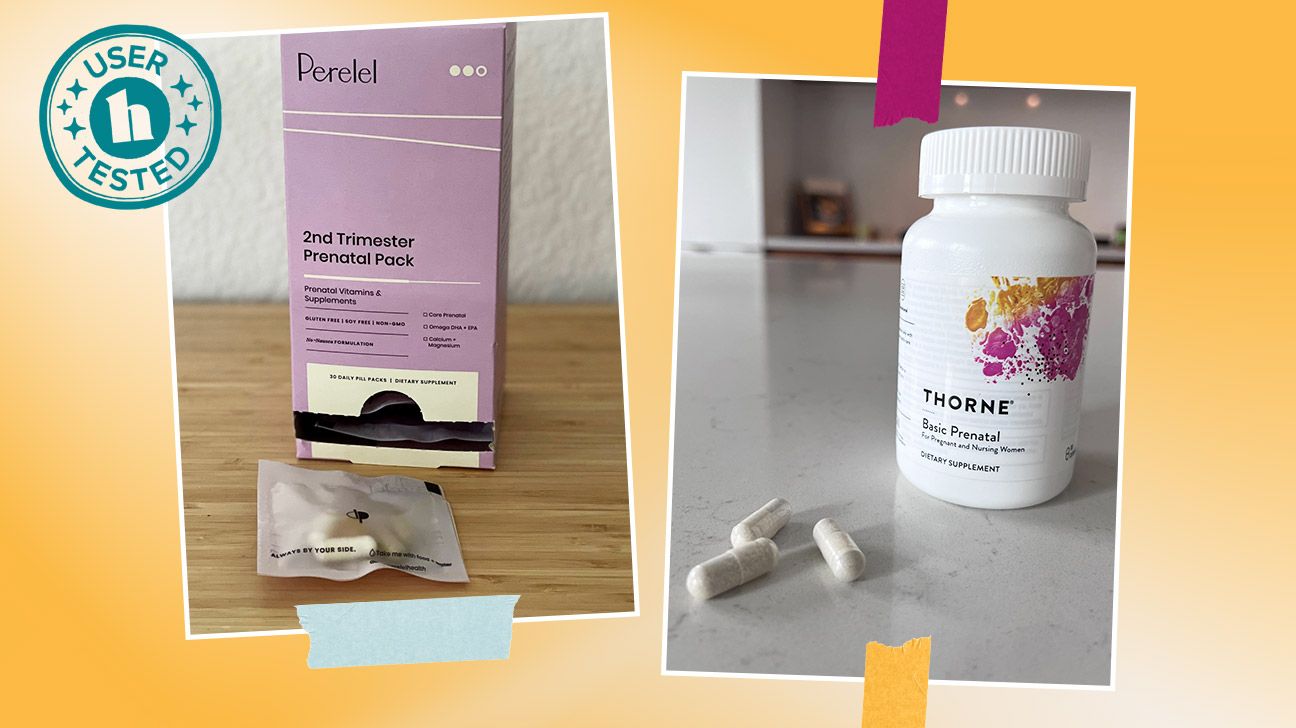To find the best prenatal vitamins, our dietitians and vetting team evaluated the ingredients of over 30 vitamins for pregnancy. Learn about their top 8 picks, read our testers’ reviews, and shop for the best prenatal vitamins here.
- Best prenatal vitamins to take before you're pregnant: Ritual Prenatal Multivitamin Capsules | Skip to review
- Best prenatal vitamin for folate and choline: MegaFood Baby & Me 2 Prenatal Multivitamin | Skip to review
- Best prenatal vitamin for easy digestion: New Chapter Advanced Perfect Prenatal Multivitamin | Skip to review
Our dietitians analyzed the ingredients, our medical vetting team evaluated the brands’ reputations and health claims, and our editors provided feedback on their experiences taking these prenatal vitamins. And the results are in.
Whether you’re looking for a pregnancy vitamin that will stay put when morning sickness hits, or you want something to take before you get pregnant, these are eight options worth considering.
DHA
DHA supports healthy brain, eye, and nervous system growth.
Folic acid
Folic acid supports neural tube development, preventing spina bifida.
Choline
Choline helps healthy brain development and maternal liver health.
A note on price
- $ = under $30
- $$ = $30 to $40
- $$$ = over $40
Note: The prenatal supplements on our list were purchased independently or by Healthline. Further, our opinions are ours alone and have not been reviewed, approved, or otherwise endorsed by the supplement manufacturers.
Having trouble deciding which prenatal product is right for you? Here’s a quick look at how our top picks compare:
Keep in mind that many companies, including FullWell and Ritual, offer additional supplements that provide key nutrients that missing in their prenatal formulas, such as DHA and EPA.
* First Trimester Pack includes an additional folate supplement, which offers 278% of the DV for people who are pregnant or breastfeeding.
Complete your prenatal product routine
Even the best prenatal vitamins often lack certain nutrients, such as choline, omega-3s, or iron.
Therefore, it may be best to consider purchasing additional supplements as needed to fill in any gaps in your diet that your prenatal vitamin doesn’t cover.
Here are some supplements that may be helpful:
- FullWell Women’s Fish Oil: Available on its own or in a bundle pack with FullWell’s prenatal multivitamin, this fish oil supplement provides 100 milligrams (mg) of EPA and 500 mg of DHA omega-3s.
- FullWell Iron Bump: For people needing additional iron, FullWell Iron Bump provides 25 mg of easily absorbable iron that’s gentle on the digestive tract.
- Ritual Natal Choline: With 550 mg of choline, you might consider using this supplement alongside the brand’s prenatal and postnatal supplements to provide more than 100% of recommended choline needs during pregnancy and breastfeeding.
- Ritual Essential Protein Daily Shake Pregnancy & Postpartum: In addition to 20 g of protein per serving, this protein powder also provides choline, calcium, and iron to support nutrient needs during pregnancy and breastfeeding.
You can check out our roundups of the best choline, vitamin D, iron, and fish oil supplements for more options.
All brands and products we feature undergo our thorough Healthline vetting process.
You can also read about how we review dietary supplements. For this list, we considered the following factors:
- Nutritional content: We included products specifically formulated to meet the nutritional demands of growing a human. We also looked for products containing forms of nutrients that are easiest for your body to absorb.
- Ingredients: We looked for supplements made from high quality ingredients and free of artificial additives and preservatives.
- Quality testing: We included products that undergo testing for purity and potency, ideally by a third-party organization.
- Firsthand product testing: We included products that our team has personally used to support their pregnancies.
Our Medical Standards and Insights team has carefully researched and vetted over 11,000 products and services. We fact-check health claims, evaluate ingredients, and look into each brand’s reputation before sharing products and services on Healthline.
To choose the products on this page, we considered all the prenatal vitamins that passed our vetting process. Then, we personally tested some of them to narrow down our list even further.
If you have pregnancy complications or other health concerns, a healthcare professional might recommend a prescription prenatal supplement. Otherwise, consider the following factors when choosing the best over-the-counter (OTC) prenatal vitamin for you:
- Included nutrients and doses: While there are several key nutrients to look for in a prenatal vitamin to support a healthy pregnancy, the best prenatal is the one that best fits your nutritional needs. Be sure to talk with your OB-GYN or other healthcare professional about necessary nutrients and recommended doses.
- Supplement type: If you dislike swallowing pills, look for a prenatal that comes in a chewable, gummy, liquid, or powdered form.
- Recommended daily dose: Some prenatals feature a one-a-day formation, while others may require taking up to 8 pills daily. Be sure to consider the option that’s best for you. While only remembering to take 1 pill is more convenient, some people report better tolerance if they divide the dose throughout the day.
- Dietary needs: If you have any food allergies or dietary preferences, such as if you follow a vegan diet, be sure to read ingredient lists carefully to select a product suitable for your needs.
- Third-party testing: To ensure that the contents of your prenatal multivitamin match the label, look for products that are third-party tested by an organization such as Labdoor, NSF, USP, or UL Solutions.
A well-rounded prenatal should include a variety of nutrients that are in high demand during pregnancy, such as:
- B vitamins, including folate: Your body needs eight different B vitamins. During pregnancy, your need for these nutrients increases. Most prenatal supplements include all eight B vitamins, but some include only a few. At a minimum, a prenatal should include B12, folate, and B6.
- Choline: Choline needs increase significantly during pregnancy, as choline plays an important role in placental and fetal development. Research suggests up to
95%Trusted Source of pregnant people don’t consume enough choline. A well-designed prenatal should cover at least some of your choline needs. - DHA and EPA: You
need moreTrusted Source of these fatty acids during pregnancy because they’re important forfetal brain developmentTrusted Source . Some prenatals contain them, but most don’t. Most pregnant people take a separate DHA and EPA supplement, like a fish oil or algal oil supplement. - Vitamin D: Although the current recommended vitamin D intake during pregnancy is 600 IU — the same as for people who aren’t pregnant — needs during pregnancy
may beTrusted Source much higher, at about 4,000 IU per day. Most prenatals contain much less, so you may need an extra vitamin D supplement. - Iron: Iron needs increase during pregnancy. However, as iron intake varies greatly from person to person, people should ideally supplement separately based on iron levels.
- Magnesium, calcium, iodine, and zinc: Needs for these minerals also increase during pregnancy, so a good prenatal will cover all or most of these.
- Vitamin A: Vitamin A is necessary for fetal eye and organ development, immune system function, and more.
These are just some of the nutrients that are in higher demand during pregnancy. A well-rounded prenatal will provide the additional nutrients your body needs during pregnancy, but it should not replace a balanced diet.
Folate and folic acid are two different forms of vitamin B9, a nutrient
- Folate: a form that’s naturally found in a variety of foods, including leafy green vegetables, beans, nuts, and fruits
- Folic acid: a synthetic form of vitamin B9 that’s often added to supplements and fortified foods
Compared with the folate found naturally in foods, the body absorbs folic acid more efficiently.
Furthermore, folic acid is the only form of folate that
For this reason, most health organizations
Read more about the differences between folate and folic acid.
But what about L-methylfolate?
Many prenatal supplements also contain L-methylfolate (also known as 5-methyltetrahydrofolate, or 5-MTHF), which is the biologically active form of folate.
Because certain genetic mutations — including the MTHFR gene mutation, which affects
In fact, a
If you’re unsure which form of vitamin B9 is best for you, consult an OB-GYN or another healthcare professional for additional guidance.
During pregnancy, your needs for vitamins, minerals, and trace elements
For example, your folate needs increase by
These and many other nutrients are essential for fetal and placental growth and the general health of the pregnant person, which is why they’re needed in larger amounts during pregnancy.
For example, supplementing with folate before conception
Taking a prenatal vitamin that contains all the nutrients needed to support a healthy pregnancy can help reduce the risk of deficiencies and ensure you’re getting the vitamins and minerals you need to keep yourself and your baby healthy.
When should I start taking a prenatal?
Most experts recommend taking a prenatal supplement for at least 3 months before becoming pregnant to ensure adequate stores of key nutrients, such as folate.
If you aren’t already taking a daily prenatal vitamin, start taking one as soon as you find out you’re expecting. You’ll continue taking your prenatal vitamin every day during your pregnancy.
Do I need prenatal vitamins after I give birth?
Yes, experts also recommend continuing to take a prenatal supplement after you give birth, though there are also several products on the market specifically designed for the postnatal period.
This is because your body needs extra nutrients to support healing after delivery and requires more nutrients during breastfeeding. In fact, needs for many nutrients are even higher during breastfeeding than during pregnancy.
Keep in mind
While prenatal supplements can certainly help fill gaps in your diet, they’re not a one-way ticket to superhuman health throughout your pregnancy.
It’s important to read nutrition labels and balance your intake of vitamins and minerals with a well-rounded, nutrient-rich diet.
A dietitian specializing in nutrition during pregnancy can help you create an eating plan based on your preferences and specific health needs.
Some people may feel nauseated after taking prenatal vitamins. Constipation can also be common, especially if your prenatal provides a large dose of iron.
If you’re having difficulty tolerating your prenatal, it’s important to talk with your healthcare professional. Here are some general tips for preventing or reducing side effects of prenatal vitamins:
- Take your prenatal with food or in the evening, especially if you’re experiencing bouts of morning sickness.
- Choose a prenatal with a form of iron that’s
less likelyTrusted Source to cause constipation, such as iron bisglycinate chelate. - To prevent constipation, drink lots of water, increase the fiber in your diet, and get regular exercise.
- Consider trying a different form of prenatal nutrients, such as a powder or gummy supplement.
The most effective prenatal vitamin is one that you tolerate best and can remember to take daily.
Perelel and FullWell are some of the most comprehensive prenatal options. Ritual is also great so long as you eat enough choline in your diet through food or purchase a separate choline vitamin.
If you need the iron — not everyone does — Thorne may be a good pick for you.
Most experts recommend taking a prenatal supplement for at least 3 months before becoming pregnant to ensure adequate stores of key nutrients, such as folate.
If you aren’t already taking a daily prenatal vitamin, start taking one as soon as you find out you’re expecting. You’ll want to continue taking a prenatal vitamin every day during your pregnancy.
Yes, it’s OK to take prenatal supplements if you’re not pregnant. In fact, experts recommend taking prenatal supplements for at least 3 months before becoming pregnant.
Research from 2019 shows that prenatal supplements have a beneficial effect on fertility, including increasing the chance of becoming pregnant and decreasing the time it takes to become pregnant.
What’s more, nutrient deficiencies can affect your ability to conceive and have a healthy pregnancy.
For example, deficiencies in vitamin D, vitamin B12, and folate can affect your ability to become pregnant.
Additionally, supplementing with a well-rounded prenatal that includes methylated folate and B12 may improve the effectiveness of assisted reproductive technology treatment.
While prescription prenatals are available, they’re not necessarily better than prenatal vitamins you can purchase over the counter.
In fact, several high quality prenatal supplements don’t require a prescription. One of the benefits of having a prescription prenatal is that your insurance may cover some of or all the cost.
Regardless of whether you opt for an OTC or prescribed prenatal, what’s most important is that you choose a supplement that’s formulated to meet the unique nutritional demands of pregnancy.
DHA is an omega-3 fatty acid that plays an important role in the development of the baby’s brain, eyes, and nervous system.
Research suggests that taking DHA during pregnancy may help prevent preterm labor, promote healthy birth weight, and support maternal mental health postpartum.
The body makes some DHA, but healthcare professionals may recommend dietary or supplemental DHA during pregnancy to support the baby’s healthy growth.
Experts recommend that all pregnant people take a prenatal supplement. A well-rounded prenatal supplement can help you meet your nutrient needs before, during, and after pregnancy. However, a prenatal vitamin should not replace a balanced diet.
The prenatal supplements we featured in this article can help ensure you’re getting the recommended amount of nutrients to keep you and your little one healthy.






